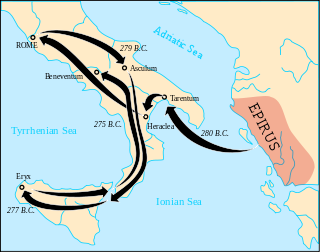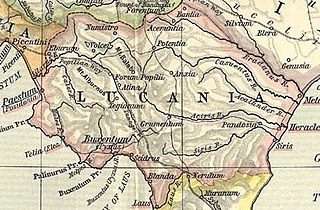This page is based on this
Wikipedia article Text is available under the
CC BY-SA 4.0 license; additional terms may apply.
Images, videos and audio are available under their respective licenses.

The Appian Way is one of the earliest and strategically most important Roman roads of the ancient republic. It connected Rome to Brindisi, in southeast Italy. Its importance is indicated by its common name, recorded by Statius:
Appia longarum... regina viarum
"the Appian Way the queen of the long roads"
This article concerns the period 709 BC – 700 BC.

Taranto is a coastal city in Apulia, Southern Italy. It is the capital of the Province of Taranto and is an important commercial port as well as the main Italian naval base.
Year 209 BC was a year of the pre-Julian Roman calendar. At the time it was known as the Year of the Consulship of Verrucosus and Flaccus. The denomination 209 BC for this year has been used since the early medieval period, when the Anno Domini calendar era became the prevalent method in Europe for naming years.

Thurii, called also by some Latin writers Thurium, for a time also Copia and Copiae, was a city of Magna Graecia, situated on the Tarentine gulf, within a short distance of the site of Sybaris, whose place it may be considered as having taken. The ruins of the city can be found in the Sybaris archaeological park near Sibari in the Province of Cosenza, Calabria, Italy.

In Greek mythology, Taras was the eponymous founder of the Greek colony of Taras, in Magna Graecia

The Battle of Heraclea took place in 280 BC between the Romans under the command of consul Publius Valerius Laevinus, and the combined forces of Greeks from Epirus, Tarentum, Thurii, Metapontum, and Heraclea under the command of Pyrrhus king of Epirus.

Lucania was an ancient area of Southern Italy. It was the land of the Lucani, an Oscan people. It extended from the Tyrrhenian Sea to the Gulf of Taranto. It bordered with Samnium and Campania in the north, Apulia in the east, and Bruttium in the south-west, at the tip of the peninsula which is now called Calabria. It thus comprised almost all the modern region of Basilicata, the southern part of the Province of Salerno and a northern portion of the Province of Cosenza. The precise limits were the river Silarus in the north-west, which separated it from Campania, and the Bradanus, which flows into the Gulf of Taranto, in the east. The lower tract of the river Laus, which flows from a ridge of the Apennine Mountains to the Tyrrhenian Sea in an east-west direction, marked part of the border with Bruttium.

Archidamus III, the son of Agesilaus II, was king of Sparta from 360 BC to 338 BC.

The Pyrrhic War was a war fought by Pyrrhus, the king of Epirus. Pyrrhus was asked by the people of the Greek city of Tarentum in southern Italy to help them in their war with the Roman Republic.

The Messapians were a Iapygian tribe that inhabited Salento in classical antiquity. Two other Iapygian tribes, the Peucetians and the Daunians, inhabited central and northern Apulia respectively. All three tribes spoke the Messapian language, but had developed separate archaeological cultures by the seventh century BC. The Messapians lived in the eponymous region Messapia, which extended from Leuca in the southeast to Kailia and Egnatia in the northwest, covering most of the Salento peninsula. This region includes the Province of Lecce and parts of the provinces of Brindisi and Taranto today.

The Via Traiana was an ancient Roman road. It was built by the emperor Trajan as an extension of the Via Appia from Beneventum, reaching Brundisium (Brindisi) by a shorter route. This was commemorated by an arch at Beneventum.
The history of Taranto dates back to the 8th century BC when it was founded as a Greek colony, known as Taras.

Heraclea, also Heracleia or Herakleia, was an ancient city of Magna Graecia. It was situated on the Gulf of Taranto between the rivers Aciris and Siris. The ruins of the city are located in the modern comune of Policoro in the Province of Matera, Basilicata, Italy.
The Port of Taranto is a port serving Taranto, southeastern Italy. One of the first in Italy for goods traffic, it is located on the northern coast of the gulf and plays an important role commercially and strategically. It has three entrances, two of which are operational. Its management is entrusted to the Port Authority, which is based within the port. Since 2011 the container terminal has been run by the Taranto Container Terminal SpA, which is 60% owned by Hutchison Whampoa and 40% owned by Evergreen Marine Corporation.
The following is a timeline of the history of the city of Taranto in the Apulia region of Italy.
The Battle of Petelia was an ambush during the Second Punic War that took place in the summer of 208 BC near Petelia. The Carthaginian general Hannibal surprised and destroyed a large Roman detachment.












